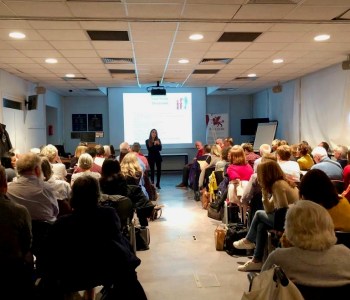 Stories
Stories The high life – a snowboarder’s secrets of success
If you’re looking for thrills – and spills – snowboarding or boarding is today’s snow-lover’s favourite. For those seeking the X-factor splitboarding – when the board divides into two to cope with tricky slopes and rough terrain – is the ultimate experience. Red Lion Group member Adam Bramley reports.

Adam Bramley and his touring ‘buddy’ Valentina

Slippery slope or path to success: Adam Bramley on Courchevel
A spell of unexpectedly warm weather in the French Alps earlier this year proved a double bonus for snowboarder and pouchee Adam Bramley. His health suddenly changed for the better and his passion to get back on the slopes was almost instantly rekindled. “Having had my takedown in October 2018 at the end of a three-stage surgical process I was absolutely desperate to get back on the snow,” says Adam, who had his operations at the Queen’s Medical Centre in Nottingham.
The intrepid boarder, who was staying in the famous French ski resort of Courchevel with his ‘touring buddy’ Valentina, adds: “The improvement continued throughout February, March and early April this year. And with some decent piste-skiing under my belt and a good few kilograms back on my frame, courtesy of copious amounts of excellent French cheese, I started looking towards bigger challenges.”
As many snow enthusiasts know, one of the key features of the French Alps is its refuges – places where people can stay varying in size from simple mountain huts to small hotels with hot food and showers. “We decided that a hut-to-hut route would give me the opportunity to get out into the mountains for a few days, making our way across untracked snow and getting in some good descents.”
On the first day the pair stood excitedly at the foot of Courchevel 1650 (the number marks the mountain’s height) with 30 litres of kit on their backs and “looking nervously up at the 1,000 metres plus of ascent we’d planned for the start of our adventure,” says Adam.
“Our three-day adventure passed in a blur. Hut-to-hut touring is a challenging undertaking at the best of times. You have to carry all your food and equipment, manage the weather, snow conditions and avalanche risk, navigate through tricky terrain, climb using nothing more than your own leg power, descend steep slopes in variable snow conditions and finally heat the hut where you are staying at the end of each day.
As well as the physical challenges, Adam had bravely decided to give his six-month-old J-Pouch a trial run without the security of any traditional back-up support or facilities.
And the highlights were spectacular. Each day the pair watched as the sun climbed over the mountains and the snow turned golden yellow in the pre-dawn morning light. On another day they had the thrill of descending a perfectly even 600m-long 45 degree slope “all the way into the valley” and during one lunch-break they were even approached by an alpine fox. Two other unforgettable moments were lying on a rock and watching as a series of avalanches poured off the upper Alpine slopes in the afternoon sun and the “feelings of fear we experienced when stuck and exposed on a bitterly windswept ridge turning to absolute exhilaration moments later as we charged off it into a late April powder-field,” says Adam.
So how did Adam’s pouch fare during his Alpine adventure? “Physically I didn’t feel too bad. There’s still a big weakness in my core and I’ve got another 10kg to gain before I’m back to my previous weight – including a lot of work to do on my abs before I can truly trust them again. The pouch was OK. It started off great, but by the end of the second day I was feeling a bit gripey, which I’m blaming on a combination of much greater physical effort than I’d done previously and a sudden change of diet. It worked though and this adventure has stoked the fires for bigger trips next time,” he says.
“What I have gained is the confidence that one day I’m going to get back to something pretty close to normal – something I wasn’t 100 per cent confident about beforehand. I’ve definitely still got a lot of healing and learning to do and my next step is going to be to take six months back at home focusing on my health. Come next winter though I’m confident that I’ll be back in my snowboard instructor’s uniform.
Next year, after a long period of unbroken recovery, Adam plans to finish his International Snowboard Teacher Diploma (ISTD) exams – which he began before his spell of ulcerative colitis – and become a fully-fledged snowboard instructor.
“It’s often stated that pouches continue to improve for 10 years – and I’m pleased with where mine is after only six months,” says Adam.





















You must be logged in to post a comment.